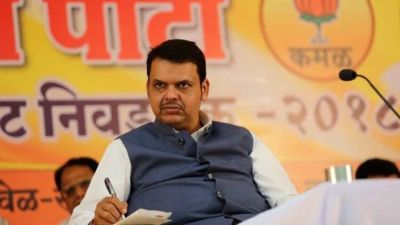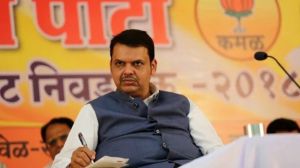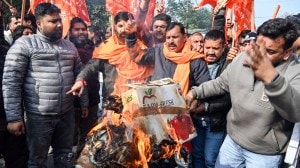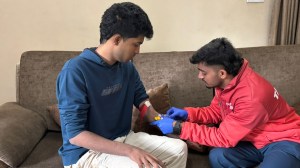A bigger, bolder policy
From Iraq to the Indian Ocean, from the forthcoming NPT conference to the Proliferation Security Initiative, from the Japanese overtures to ...

From Iraq to the Indian Ocean, from the forthcoming NPT conference to the Proliferation Security Initiative, from the Japanese overtures to the March 25 statement from Washington, Indian foreign policy is facing opportunities like never before. If Delhi has the boldness to dump the non-aligned rhetoric of the past, the country stands to gain in many areas.
In Iraq, attempts to make it a modern democracy seem to follow the early years of the Indian state. India elected a constituent assembly in 1949, Iraqis elected theirs in February 2005. The first constituent assembly had an overwhelming Congress majority. No Indian suggested at that time, or recently, that the Congress was a Hindu party, except for the Muslim League which had raised the demand for Pakistan. Most Indians had no doubts that Hindu and Muslim opinion would be represented fully within the Congress party. The presence of Zakir Hussain and the Maulana ensured that this was factually so, although many Muslims who migrated to Pakistan did cast aspersions on the integrity of both leaders. So it is with some despair that one reads the many reports in the press, by Indian intellectuals and journalists, that the Iraqi elections are not fair because the Shiites have a majority, that this majority is not 8216;8216;good8217; or stabilising for Iraqi democracy, that the Sunnis needs 8216;8216;special8217;8217; representation and that Sunni terrorism is secretly justified on grounds of the inevitable injustice which will be done to them by the brute Shiite majority.
This stand, which only repeats Jinnah8217;s arguments, is also so unfair to the desperate attempts being made by Ayatollah Ali Sistani to move his country to as secular a democracy as is possible in the volatile Middle East region. We have our own volatile region in Kashmir, where the strategy of the Indian Republic has been to push political democracy on the Kashmiri people. They too have seen a partial boycott of the democratic process, mainly by a coalition of Sunni fundamentalists whose real grouse is quite different from their ostensible
complaint. In Kashmir, fundamentalists fear that in a fair election they would simply disappear, so they want to shift it to a vote on religion. The Iraqi Sunnis have a replica of the same strategy. The first Iraqi election produced a voter turnout of 58 per cent in an election marred by violence and forty deaths. In the first election held after Governor8217;s Rule in Kashmir, the voter turnout was considerably less, but that election led to the next one which gave the present government. Today no one in India would question the democratic credentials of the Mufti government.
The Iraqi Constitution is to be written by August 2005, five months after the election results were announced and submitted for a national referendum by mid-October. If the Sunnis missed their chance to vote in the election, they may have a chance to register their feelings in the referendum. The Shias are already voting in a split fashion, apart from fielding a number of Sunni and Kurd candidates in the United Iraqi-Alliance. So the overall pattern that emerges in Iraq is not far different from the victory of the Congress in the first Indian election, or the victory of Mufti8217;s party in the J038;K elections.
What is most daunting is the timeline for the Iraqi democratic process. If the referendum approves the constitution in October 2005, the Iraqi people will vote in another general election on December 15 and a new government is to be installed by December 31. The challenging deadlines are probably set so the Americans can begin to hand over power and commence their withdrawal sooner rather than later. The government that emerges in Iraq will be democratic, perfectly legal and enjoy broad-based popular support. Indians have often pointed out the fact that of the hundreds of jihadi terrorists arrested world-wide, none was an Indian Muslim. It is time for Indian analysts to also recognise that none of the 19 involved in the World Trade Center bombing was a Shiite.
The winds are changing in the region and New Delhi needs to acknowledge the change sooner. Even Saudi Arabia is beginning to change. In the first ever elections in Saudi Arabia, for half the seats in all municipal councils, it is an even chance that some Shiite candidates might get elected in the eastern territories. Added to these changes are the exciting possibilities of a Palestinian settlement with the courageous Abbas leading his people. The Syrian withdrawal from Lebanon might even see the transformation of the Hezbollah into a full-fledged political party.
The Congress party was asked to make a difficult choice immediately after coming to power on whether to help in Iraqi peacekeeping efforts. The decision, eventually, was to play it cautiously. Foreign policy can always be run on the principle of 8216;8216;wait and see8217;8217; but that will only produce successful diplomats, not a successful foreign policy.
On India8217;s access to high-tech military technology, the American offer today is stunning. Our thirty year old complaint that the NPT, the NSG and the dual use technology denial regimes have targeted India has now been rubbished with the American offers of joint production of world class combat aircraft. This is not to be mistaken for a hardware sale, but a realisation that the Americans can live with a regional power like India, which operates F18s, the P3Cs, and the SU30 MKI.
The UN restructuring committee8217;s report recommends that nations join the PSI, a decision long pending in Delhi and Washington. Secretary Rice8217;s visit is to be followed by visits of the treasury and transportation secretaries, leading to visits by both heads of states. India8217;s aspiration to be a regional power has found acceptance in Washington, and quite possibly with the EU and Japan. With this status come responsibilities, and a willingness to shed the diplomatic autarky that may have served us well earlier. A number of new initiatives have to be taken that go beyond the charter of the desk officers in the MEA. Political management is also called for, particularly with many ex-ministers, now in the Opposition, making opportunistic statements that disadvantage the country, to benefit their party. This journey must leave Pakistan behind, and if twenty-four F16s make Pakistan feel secure, all the better.
- 01
- 02
- 03
- 04
- 05































